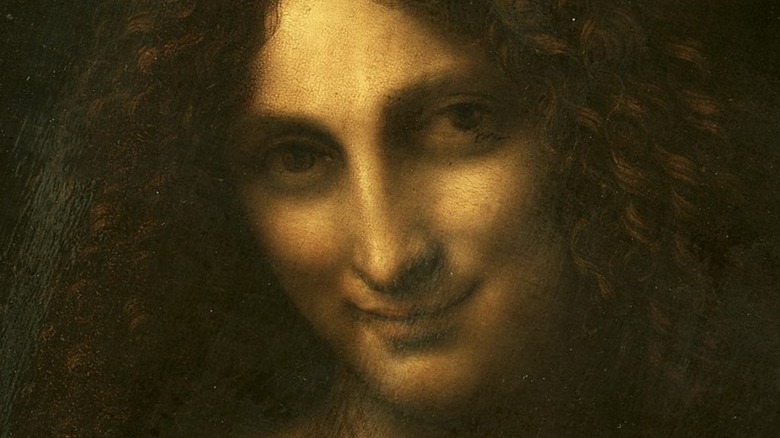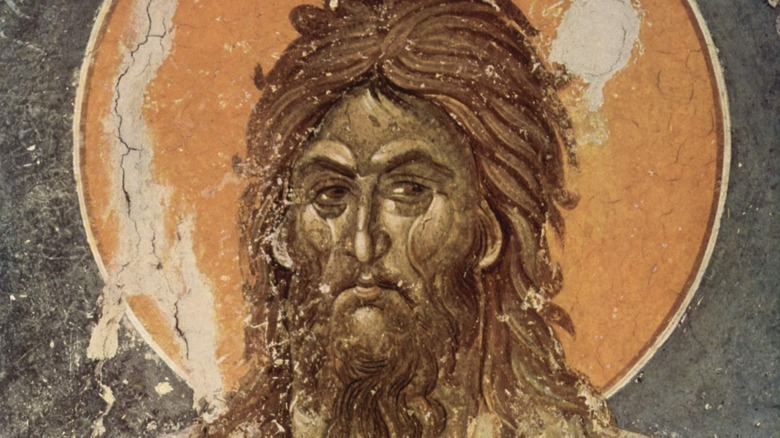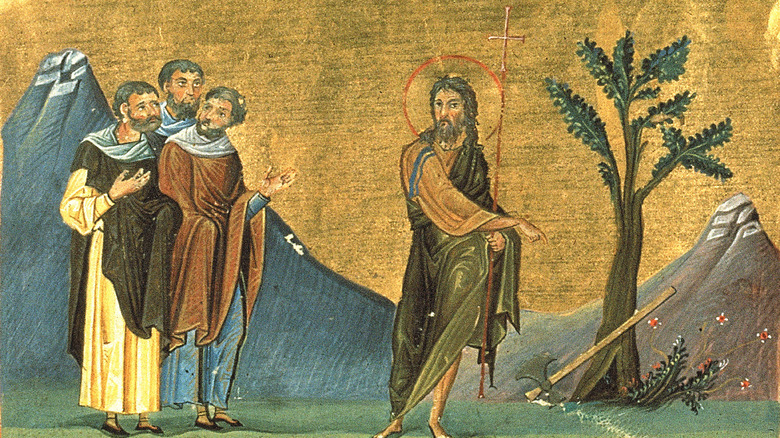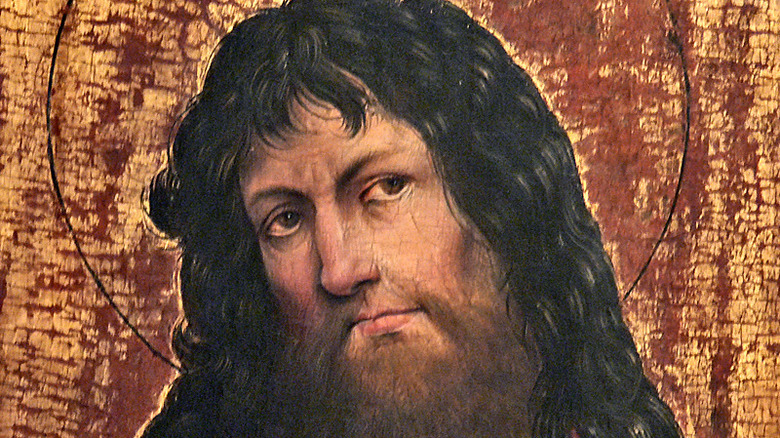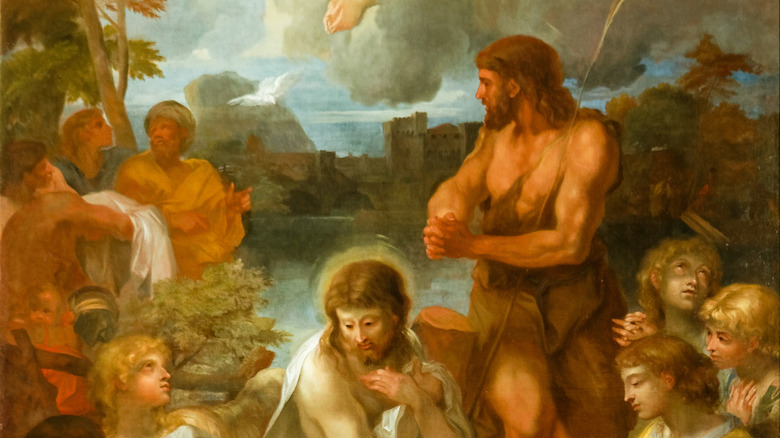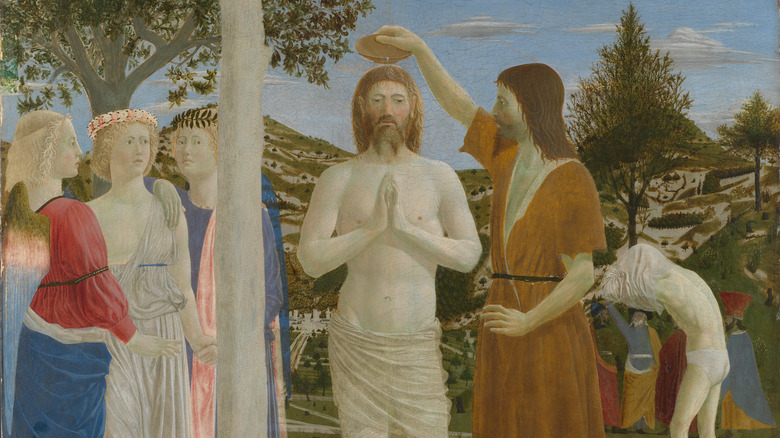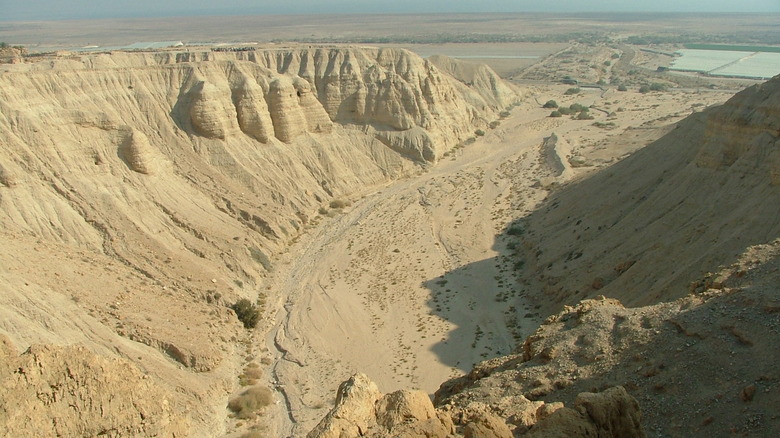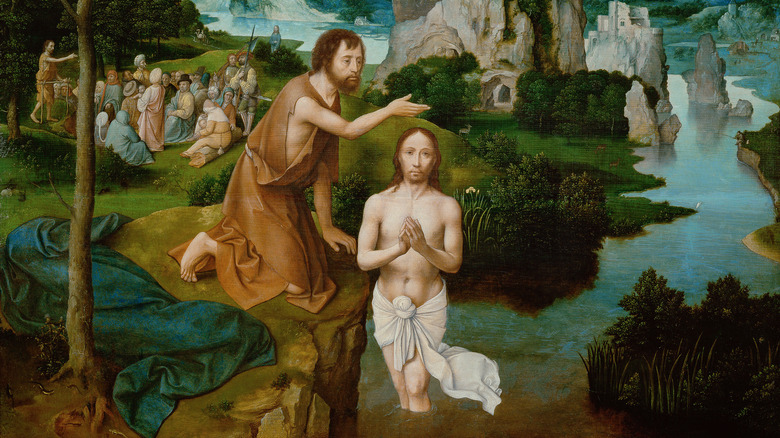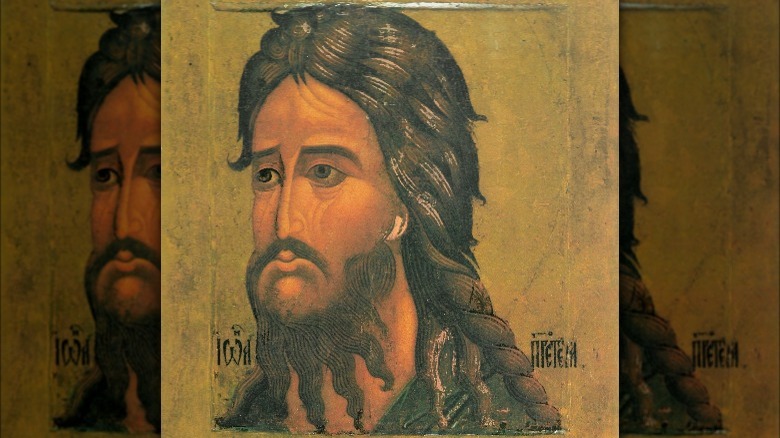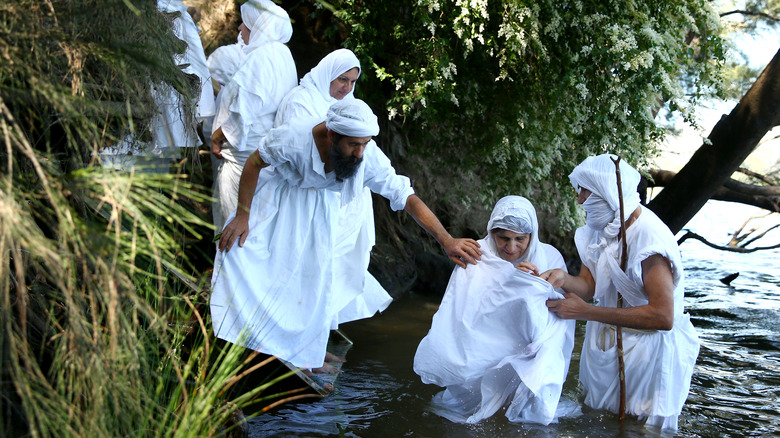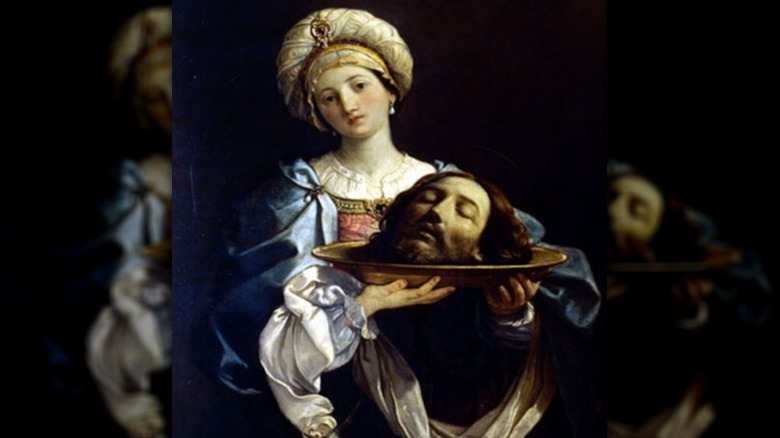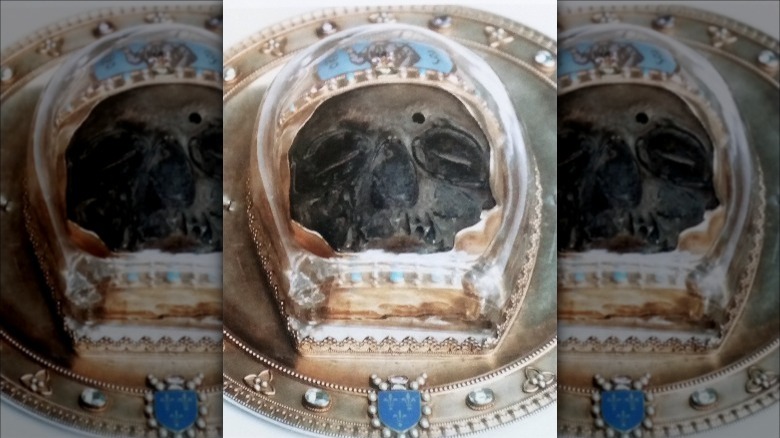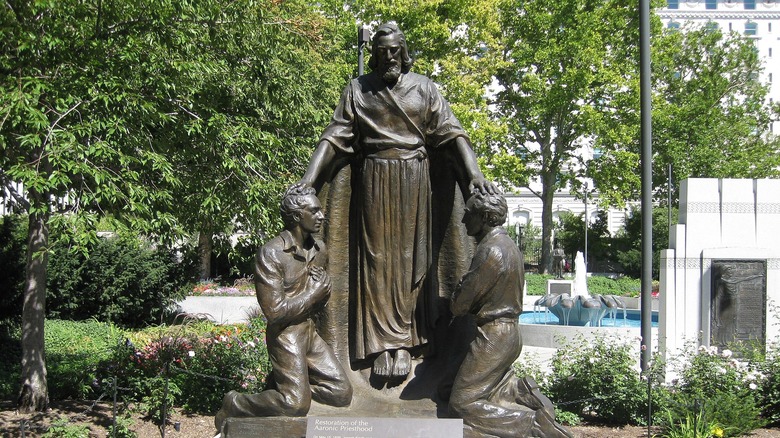The Untold Truth Of John The Baptist
Quite a lot of the New Testament of the Bible is taken up with the story of Jesus Christ, from his life, to his teachings, to the reverberating effects of both throughout world history. Yet, it's worth remembering that Jesus didn't appear out of nowhere. In fact, he was part of an already rich and varied religious landscape that was primed to look for a savior. Said messiah would come to liberate the Jewish people and restore the glory of Israel (via Britannica).
Part of the yearning and lore associated with the messiah includes the striking figure of John the Baptist. Within the Gospels of the New Testament, John acts as a precursor to the main show of Jesus, prophesying his coming religious revolution (Jesus pays it back by talking up John's earthly greatness in Matthew 11:11). Then again, he's more than a herald and, for some of his followers, may have even seemed like he was the messiah himself. Even if you don't believe that he was, the untold truth of John the Baptist is complex, rich, and utterly fascinating.
The Gospels say that John the Baptist was a big deal
Take a look at the New Testament, and you'd be hard-pressed not to come across John the Baptist eventually. That's because the four Gospels (Matthew, Mark, Luke, and John) as well as the book of Acts, all discuss John in varying levels of detail. Even when they aren't getting into the nitty-gritty of his story, though, the writers of these Biblical books make it clear that John was kind of a big deal.
All of these texts more or less paint him as a precursor to Jesus, oftentimes comparing him to Old Testament prophets like Elijah. His baptism of Jesus is usually marked as the beginning of Jesus' ministry and the Christian era. But, as Britannica notes, the Gospels writers were seemingly careful to not give John the Baptist too much credit, lest he overshadow Jesus.
John, they argue, is a forerunner who had "come first to restore all things," in the words of Jesus himself in Mark 9, directly linking John and the earlier and much renowned Elijah. And it seems that being the herald of a personage as serious as that of Jesus comes with the added indignity of obscurity, at least within one's own lifetime. That includes an ignominious death and, within the Gospel of John, the reduction of John the Baptist's work from that of a towering prophet to a more humble preacher whose baptism of Jesus isn't even mentioned in the text.
There's non-Biblical evidence of John the Baptist
Given the fact that the events of Jesus and John the Baptist's lives happened about 2,000 years ago, however, getting non-Biblical confirmation of their lives can get tricky.
When it comes to John the Baptist, however, we do have some evidence outside of the Bible. According to the World History Encyclopedia, 1st century Jewish historian Flavius Josephus also mentions John in the writer's account of the reign of Herod Antipas of Galilee. During an account of Herod's rather shocking marital switch-ups (he had divorced his first wife to marry the widow of his half-brother, a big no-no for many observers at the time), Josephus brings up "John, that was called the Baptist."
In his "Antiquities of the Jews," Josephus writes that John "was a good man" who encouraged the Jewish people to act righteously and so garnered a pretty large following. Herod, perhaps considering the way that strongly motivated crowds of people had ended the lives of other rulers, had John killed. Critically, Josephus' account doesn't have much of the same drama of other stories that claim to tell of the end of the preacher's life. But he does note that many Jewish people saw some of Herod's subsequent troubles as a sign of God's judgment, and also kept alive the tradition of baptism established by John himself.
John was known for his austere lifestyle
While John the Baptist may seem like a pretty singular figure, the truth is that he wasn't the only preacher working in the region at the time, as Jesus could eventually attest. And, as Smithsonian Magazine reports, Jesus (and, by extension, John) was drawing upon what were already well-established Jewish traditions of gathering, preaching, and prophecy.
Even when it came to his lifestyle, John the Baptist wasn't entirely alone. He was apparently well-known for asceticism, with his desert home, rough clothing, and a highly restricted diet that supposedly consisted of locusts and foraged honey, according to Matthew 3:4. But that was already an established practice for a few dedicated Jewish people, per Oxford Bibliographies. Many seemed especially focused not just on generally denying themselves sensual pleasures or even basic needs, but also specifically on fasting and abstaining from many types of food. For his followers, John's asceticism may have been extraordinary compared to many peoples' everyday lives, but it wouldn't have been totally unfamiliar, either.
There are many connections between John the Baptist and Jesus
The common story often relayed in sermons and Sunday school lessons is that John the Baptist and Jesus were cousins. However, "cousin" is a bit of a tricky term, Aleteia notes, given that Hebrew didn't really have a word that directly translated to our modern understanding of the term. All we can be decently sure of is that the Bible says that John's mother, Elizabeth, and Jesus' mother, Mary, were somehow related and that so, to, were their sons.
While the Gospels at least note that Jesus and John were essentially kinsmen, there are deeper similarities between their ministries and how the two men were received. Bible Odyssey says that John seems to have preceded Jesus by some period of time, given that Jesus came forth to be baptized by his relation. In fact, it could be that Jesus was a follower of John for some time, though that remains pretty speculative.
We do know that Jesus, who may have taken some of his cues from John's preaching and also may have snagged some of John's followers, paid his respects to John multiple times in the Gospels (though Matthew 11:11 complicates that a bit, given that he follows up his praise with the assurance that the least of those in heaven are still greater than John). And both men were clearly very invested in preaching of a coming change and the much longed-for Messiah who would liberate the Jewish people.
There may have been competition between followers of Jesus and John
Palestine at the time of John the Baptist was an unsettled place. Britannica notes that local rulers like Herod and his successors were still allowed to reign, but they did so under the watchful eye of the Roman Empire. After Herod's death, his kingdom of Judea was split into constituent parts, with some going to more heavily Jewish areas and others more populated by non-Jewish Gentiles. Eventually, Roman governors were sent in to manage the region, often collaborating with Jewish high priests to maintain order and bolster Rome's interests.
It's no wonder, then, that there was also a fair amount of religious anxiety and competition. After all, many Jewish people dreamed of a liberating messiah. But who was he, exactly? The World History Encyclopedia points out a couple of verses from the Gospel of John that hint at a rivalry, or at least that say Jesus was gaining more followers than John the Baptist.
But, lest you think that this was the beginning of a known-down, drag-out fight between potential religious liberators, it may be a good idea to take a step back. "John the Baptist in History and Theology" claims that this could be viewed as a more good-natured rivalry, or at least one that never boiled over into accusations of falsehoods. And, within the context of the Bible, John is nearly always carefully framed as a precursor to Jesus who talks glowingly about the former's true divinity.
John may have been part of a special religious sect
Though John the Baptist is depicted as an independent preacher, some scholars think he may have connections with groups like the Nazirites or Essenes. Per Britannica, Nazirites weren't exactly a cohesive group, but were instead individuals who had taken vows of religious observation and abstinence for either a lifetime or for a set period of time. Nazirites were typically marked out by their long, uncut hair and abstinence from wine. Many also live separately in the desert. All factors seem to link to John, including a line in Luke 1:1-18 where an angel tells John's father, the priest Zechariah, that his coming son shouldn't drink wine.
But was John part of a wider or at least more organized community? Per Britannica, some believe that he may have had some connections to the Essenes, a group of ascetics, including a group living at Qumran. According to Bible Odyssey, it's possible that John may have trained with them or taken his cues from their apocalyptic and baptism-focused beliefs. He may have also been linked to them through his family's priestly heritage, as some members of the Essenes were themselves Jewish priests. Then again, John's work also drew in a wider range of people and, given his use of rivers for baptizing rather than ritual baths, may have been at least a little less intensely focused on ritual purity.
Baptism had a specific purpose in John's ministry
Though John the Baptist's focus on baptism was such a big part of his practice that it became a part of his title, he wasn't exactly an innovator on this front. According to PBS, ritualized immersion in water was already part of Jewish tradition. Variations on baptism and washing were practiced by a variety of different groups and religious sects, including the Qumran community that may have had links to John himself.
That said, John's specific teachings around baptism were pretty unique. He had a particular focus on prophecy and a coming apocalypse that was tied into the immersion ritual. As Britannica reports, baptism apparently wasn't key to following John's teachings, but it was a highly symbolic representation of someone's contrition ahead of divine judgment. It was a significant step away from previous conceptions of bathing or immersion, where ritual purity was the main focus.
Baptism, at least how it was interpreted in John's practice, wasn't a free ticket into Heaven, either. Those who had gone through the ritual would have been expected to keep themselves on the straight and narrow. Moreover, once the apocalypse happened, they could expect a second baptism of sorts via fire, delivered by the Holy Spirit.
Sources don't totally agree on how John the Baptist died
First century historian Flavius Josephus says that John was killed for having too many dedicated followers. According to the World History Encyclopedia, that made local ruler Herod Antipas pretty nervous. Wanting to nip a potential rebellion in the bud, he reportedly had John the Baptist imprisoned and then killed. It was a brutal move, but one that might be understandable, given how often unwieldy groups in Judea tended to tip over into rebellion. It's also worth remembering that Herod was operating under Roman oversight. If he revealed himself as a weak ruler who couldn't control his own people, then perhaps the imperial overlords would see fit to replace the king with someone more to their liking.
Yet the Gospels have more to say about the end of John the Baptist's life. Generally, they claim that he was beheaded for calling out the troublesome marriage of Herod Antipas. Herod had divorced his first wife and married his half-brother's widow, Herodias, a violation of Jewish law. In the Gospel of Mark, Herodias uses the opportunity of her husband's birthday to garner favor with Herod, using her daughter Salome's dancing to get the king to grant the younger woman any wish she desires (via Britannica). Clearly coached by her mother, Salome asks for John the Baptist's head and thus the prophet's life is ended in a rather operatic fashion.
Mandaeans believe John the Baptist was a great teacher
For many Christians, the matter of who was the Messiah is pretty well settled. It was Jesus, of course — right? But those who practice the ancient religion known as Mandaeanism have a different answer. A bigger liberator, they say, was actually John the Baptist.
Per Britannica, the Mandaean belief system is definitely rooted in history, though no one can quite agree on exactly when or where it started. It certainly seems to share some commonalities with Judaism, from the use of some Hebrew scriptures to social and ethical norms that might seem familiar to Jewish people today. Mandaeans also tend to place a lot of emphasis on baptismal ceremonies, which is pretty fitting, given that they hold John the Baptist in such high esteem. In fact, John is such a big deal in this religion that Mandaeans may refer to the Book of John, which goes into greater detail about his ministry.
However, it's key to note that Mandaeanism doesn't necessarily claim that John the Baptist was the real-deal messiah, either. He's certainly got a prominent place in their religion, with multiple baptismal rituals performed throughout a believer's life, according to The World. But it may be more accurate to think of him as a revered teacher than anything else.
People have been searching for his head for centuries
Part of John the Baptist's story is his imprisonment and eventual beheading courtesy of an order from Judean ruler Herod Antipas. Strictly speaking, his Biblical tale ends there. Yet, many people throughout the years haven't been able to help wondering: just what happened to John the Baptist's head?
The path of John's disembodied cranium gets pretty murky after it was reportedly presented to Herod on a platter. The Gospels don't bother to elaborate and neither does Josephus, according to History. Popular tradition says that the rest of his body was buried in modern-day Palestine, but that doesn't necessarily mean his head was included in the burial, too. At least four different locations claim to hold John the Baptist's head now.
Yet, given that John is only known to have had the one skull, only one of these locations could be potentially right (or none of them at all, as skeptics point out). They currently include the Umayyad Mosque in Damascus, Rome's Church of San Silvestro in Capite, and Munich's Residenz Museum. Atlas Obscura reports that Amiens Cathedral in France also contains a human skull displayed in an elaborate reliquary, collected by a French crusader in the 13th century. However, with no way of confirming whether or not one of these skulls is that of John the Baptist — there are no DNA samples to compare these to, for instance — the fate of John's head remains a mystery.
John the Baptist is big in the relic trade
Even not taking his missing head into consideration, there are quite a few relics that purport to be sourced from various parts of John the Baptist's body. And, given the history of venerated body parts in the Christian church, relics like these could be a pretty big deal. The BBC's History Extra notes that relics were essentially tourist attractions, and a town or city that could display a piece of a big-name saint or at least an object associated with them could make a pretty penny.
Given his close ties to Jesus Christ, it's no wonder that various sites claim to have bits and pieces of the Baptist, including his right arm (via History). Germany's Aachen Cathedral also purports to hold the cloth that swathed John the Baptist's head immediately after his execution (along with what's believed to be Jesus' swaddling cloth and his loincloth).
One Bulgarian church has perhaps the best claim to genuine relics of John the Baptist. According to National Geographic, bones were discovered in a marble reliquary within the church's ruins in 2010. They included a tooth, part of a right hand, a section of cranium, a forearm, and a rib. Larger animal bones were also included in the mix, perhaps to bulk up what would otherwise be a kind of scanty-looking array. Dating and DNA testing of the knucklebone indicate that it belonged to a 1st century man who lived somewhere in the Middle East.
The LDS church has its own take on John the Baptist
John the Baptist shows up in a few non-Christian traditions, from Mandaeanism to Islam, where the faithful's takes on his role seem about as varied as the number of people discussing John. Even within Christianity, there are plenty of opportunities to present new takes on this enigmatic figure. Take the role of John the Baptist within the Church of Jesus Christ of Latter-day Saints (popularly known as the LDS or Mormon church).
Quite a lot of the LDS take on John the Baptist's story follows closely to that of the Gospels, with a few exceptions and some significant variations. Joseph Smith, founder or revealer of the Mormon faith, preached that a young John narrowly escaped death at the hands of King Herod. This would be the predecessor to Herod Antipas, the ruler that would eventually end John's life. According to the Gospel of Matthew, the first Herod's order to kill all male babies came after prophecies of an ascendant "King of the Jews" made him worry about a potential coup. Yet, the BBC points out that the "massacre of the innocents" was only ever mentioned in Matthew and wasn't at all referenced by Flavius Josephus.
Joseph Smith also claimed that John reappeared to Smith and Oliver Cowdery in 1829 Pennsylvania to ordain them into the church's Aaronic priesthood, now an important feature of LDS belief. After the visitation, the two went to a nearby river and baptized each other.
